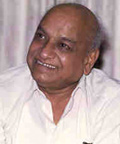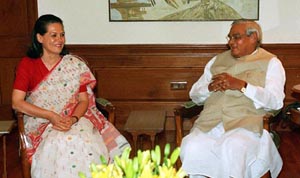
THIRD FRONT MANIA
WANTED : A NATIONAL GOVERNMENT
Author - VT Joshi

|
THIRD FRONT MANIA |
Most political and regional outfits have long nursed an abiding faith and betrayed a tantalizing fascination for the wisdom of forming a third front to capture power at the centre, as though it is a panacea for all the political ills of the country.
Whenever there is a divergence of opinion or crisis of confidence the smaller parties, particularly the leftist groups, tend to toy with the idea of forming a new front as a viable alternative to the Congress and the Bharatiya Janata party, the two main political forces which have almost polarized the polity in the past few years, despite their own failing on many fronts.
If the past experience is any guide it should be obvious to the meanest intelligence that no combination of parties and regional groups can survive without the open or tacit support of either of the two main stream parties which together hold a good number of majority seats in the Lok Sabha. (483 in a house 545 i. e. Congress 245 and BJP 238). The last quarter of the last century is replete with experiments in forming, reforming and deforming fronts of a bewildering variety of descriptions like national front, united front, left front, third front while recently there was also talk of a fourth front!
The virtual rout of the Congress party in most states in north India in the 1967 general elections, which saw to it that one could travel from Amritsar to Calcutta without touching a congress governed state, paved the way for what, in retrospect, must go down as the "disastrous SVD experiments". (Samyukta Vidhayak Dals were short lived conglomerations of opportunistic anti-congress outfits to capture power).
Exactly a decade later came the first ever serious attempt to provide an alternative non-congress government at the centre after the ignominious debacle of the congress party in the post emergency elections of 1977. The fall of the unified Janata Party government led by Morarji Desai in barely 20 months ushered in the coalition era with all the attendant evils of opportunistic alliances -- except for brief periods of apparent political stability again under single party congress rule at the Centre. Thus there had been a passing show of prime ministers from Charan Singh, Chandra Shekhar, V. P. Singh, Deve Gowda, I. K. Gujral followed by six years of National Democratic Allince under BJP led regime of Atal Behari Vajpayee.
Two outstanding examples of political opportunism to suit regional politics are the roles of the two Tamil parties --DMK and AIDMK - who have been flirting with the main national parties alternately to suit their intra state personal rivalries of M. Karunanidhi and Ms. Jayalalita. The role of Ram Vilas Paswan must take the cake for running with the hare and hunting with the hound in recent months. His utterances and actions have touched a new low in political absurdity.
IDEOLOGICAL BOGEY
The present dispensation of the UPA government under the transparently honest but helpless Prime Minister, Dr. Manmohan Singh, led by a major national party like the Congress, has to tolerate the likes of Lalu Prasad and Ram Vilas Paswan and a host of their ilk, and pander to their whims and fancies. It shows the pitfalls of unprincipled combinations in the name of secularism versus pseudo-secularism versus communalism. All these are pursuits of ideological bogey being bandied about in the power game at the expense of good governance and far removed from the ground realities and welfare of the common citizens.
The intra party bickering in the BJP and the fanatical propaganda in the name of secularism in the Congress and leftist camps are the manifestations of their ideological pretensions to cover up: (1) the dynastic ambitions in the Congress (2) the communist game of "conquering" the country (3) the RSS dream of taking it back to the 18th century. According to knowledgeable sources, apart from its badly shaken pristine ideological moorings the RSS has developed a vested interest in safeguarding its vast properties acquired across the country and does not want to loosen its grip on its political wing at any cost.
The so-called RSS-Advani controversy is essentially a struggle between "hard line Hindutva" and its softer variety, according to the former MP chief minister, Digvijay Singh. Apparently Advani's fulsome praise of Mohammad Ali Jinnah merely provided the backdrop. Had he struck to it, he would have done a great service towards resolving the long simmering Indo-Pak impasse.
A NATION OF MINORITIES
More importantly however, L. K. Advani seems to have belatedly realized that the BJP can never win a clear mandate from the people of India to rule the country on the "Hindu only" plank, as profoundly enunciated by Sudheendra Kulkarni (who was later unceremoniously sacrificed). It is immaterial whether Advani has done this out of political prospects and personal ambitions or for altruistic reasons.
Suffice it to accept the fact that Advani has accepted the hard reality of India being a vast, complex and complicated land and clime. It is a brutal fact that India is a "Nation of Minorities" in every sense of the term with in-built checks and balances. A linear ideology of any kind will not therefore appeal to the people. So any ruling party has perforce to tread the middle path notwithstanding the sound and fury of the likes of Ashok Singhal and Pravin Togadia on the one hand and Sitaram Yechury and Gurudas Dasgupta on the other. Even the "revisionist" Marxist chief minister of West Bengal, Buddhadeb Bhattrarjee, has painfully realized it in the economic and social arena -- much like Advani has in the political, religious and communal matters.
PIPE DREAM?
So what is urgently needed is not a third or fourth front but a purposeful national government with a broad understanding between the two main political forces of the basic realities and the dire needs of the of the poor, under-privileged masses of the country. Which means an understanding between the Congress party and the BJP in the larger national interests. They have perforce to reform and reorient themselves in tune with the hard facts on the ground by jettisoning their bogus ideological baggage. It means a broad national government of soft Hindutva and genuine secularism.

Will they ever rise to the occasion and do it ? Or is it a pipe dream? If Iran--Pakistan--India gas pipe line is not a pipe dream, despite the initial hiccups and heavy odds it faces, why should Congress - BJP understanding be a pipe dream???
VT Joshi
24 October 2005

VT JOSHI (1925-2008) worked for more than fifty years as a journalist. He retired from THE TIMES OF INDIA in 1989. During 1985-89 he was the Special Correspondent of THE TIMES OF INDIA in Pakistan. His books "PAKISTAN: ZIA TO BENAZIR" and "INDIA AT CROSS ROADS" (co-author GG Puri) were widely reviewed in both India and Pakistan.

Website developed and managed by

MF-104, Ajay Towers, E5/1 (Commercial),
Arera Colony,
Bhopal - 462016 INDIA

© All Rights Free